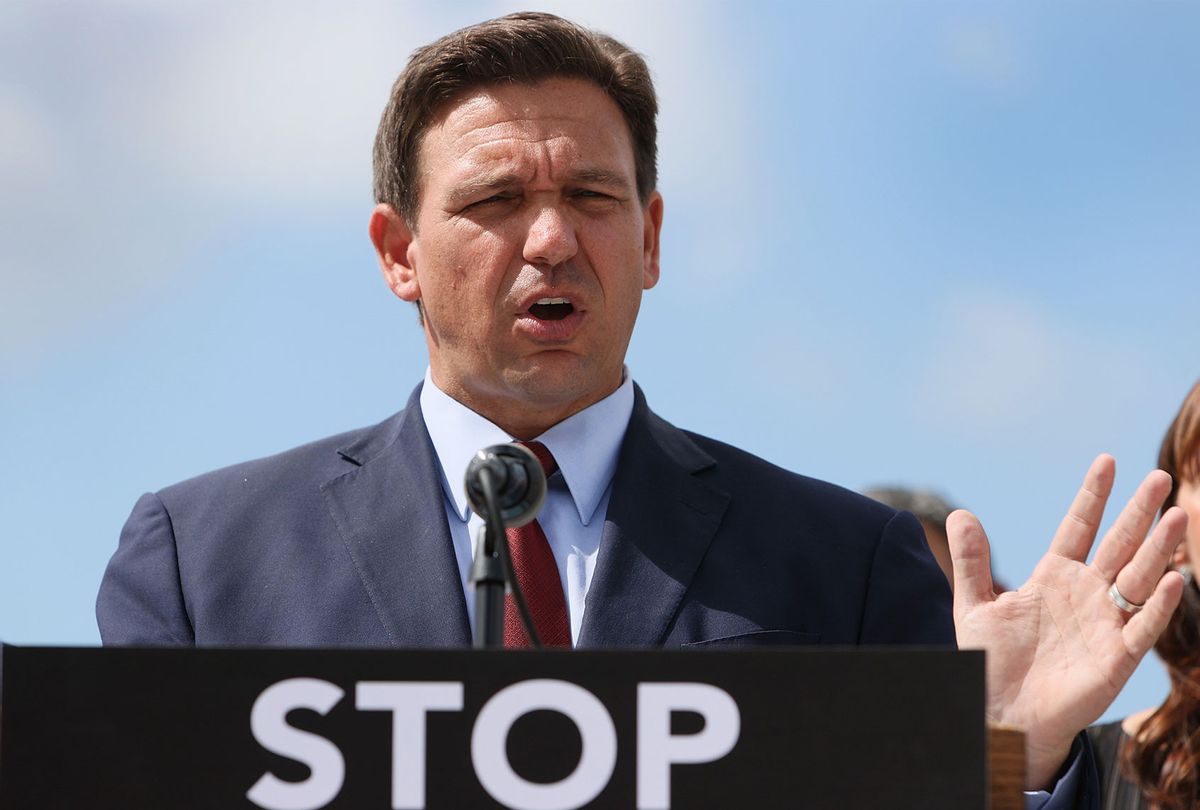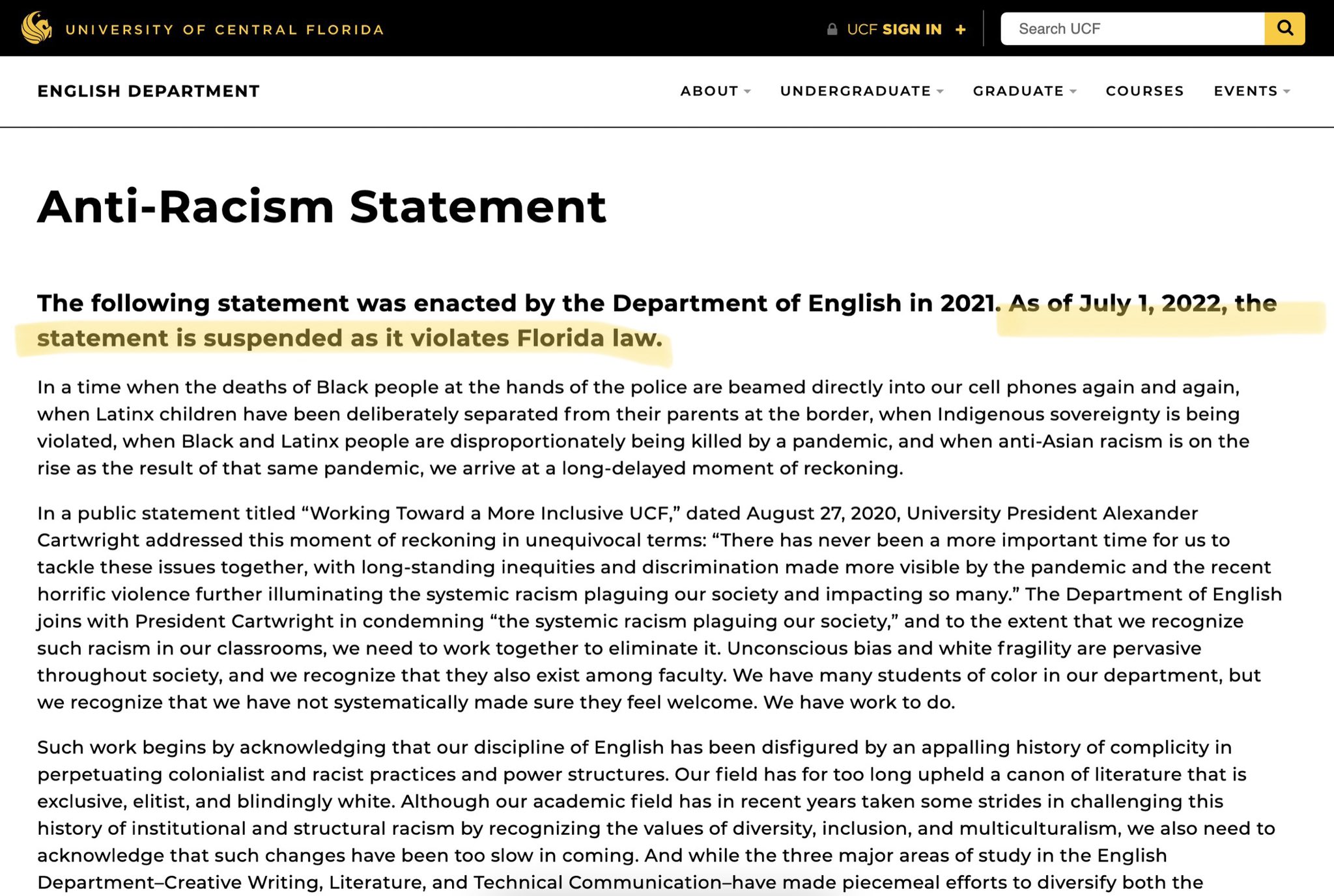In his latest effort to regulate higher education, Florida Gov. Ron DeSantis signed legislation back in April that will allow the state to oversee the inner workings of universities, or what DeSantis referred to as a "hotbed for stale ideologies." The series of regulations, collectively called the "Stop W.O.K.E. Act," took effect on July 1st and includes changes to the tenure system, the abolishment of widely accepted accreditation practices, and mandatory yearly "viewpoint diversity surveys" — perhaps the most controversial part of the new regime. The law also places a ban on training focused on race or diversity in schools and in the workplace.
"It used to be thought that a university campus was a place where you'd be exposed to a lot of different ideas," DeSantis said at a press conference earlier this year. "Unfortunately, now the norm is, these are more intellectually repressive environments. You have orthodoxies that are promoted, and other viewpoints are shunned or even suppressed."
The "Stop W.O.K.E. Act," where "W.O.K.E." stands for "Wrongs to Our Kids and Employees," falls in line with the right wing's nationwide campaign to rid public education of "critical race theory."
DeSantis, who himself attended Yale and then Harvard Law School, has been a longtime critic of elite universities that he believes have become "repressive environments" for conservative thinking and ideas. At its inception, DeSantis championed the legislation as a strong stand against what he saw as state-sanctioned critical race theory. "We won't allow Florida tax dollars to be spent teaching kids to hate our country or to hate each other," he said.
"I also want Florida to be known as a brick wall against all things 'woke,'" DeSantis said back in February. "This is where 'woke' goes to die."
Since Friday, when the law went into effect, the "Stop W.O.K.E. Act" has faced strong legal challenges. Led by Associate Professor Robert Cassanello at the University of Central Florida, critics argue that the law violates teachers' constitutional rights.
"The governor, and the Florida Legislature acting at his behest, has repeatedly sought to punish companies who have engaged in speech that displeases him, in flagrant violation of the First Amendment," the preliminary motion filed last week read.
A professor of the civil rights movement, Jim Crow America, emancipation, and reconstruction, Cassanello is worried that the regulations will restrict his ability to fully teach his courses. DeSantis' new law restricts the "ability to accurately and fully teach these subjects," he said.
Cassanello's institution, the University of Central Florida, withdrew its anti-racism statement after the law went into effect.
Teachers, a student, a professor and a diversity consultant filed a lawsuit in April to challenge the constitutionality of the legislation, but their suit was thrown out after a U.S. District judge determined teachers and students do not have the standing to sue, writing that he was not "determining whether the challenged regulations are constitutional, morally correct or good policy." So a new group of plaintiffs asked a federal judge to issue a preliminary injunction against the law.
After the initial passage of the act, several Florida legislators came out strongly against the governor's attack on higher education.
Member of the Florida State Senate Bobby Powell sees the legislation as an attempt to suppress the history of people of color. "You cannot discuss Robert E. Lee, or George Wallace, or Selma or Charlottesville without context…Slavery happened. Hangings happened. Burnings happened. Massacres happened. Jim Crow happened. George Floyd happened. And no amount of legislative banishments can erase those uncomfortable facts," Powell said.
Even amid the lawsuit, Florida's state government started approving mechanisms to enforce the new legislation this week. The board is working on passing penalties for university employees who do not go along with the new regulations. Additionally, the implementation will now tie state university funding to compliance.
Brett Sokolow, president of the Association of Title IX Administrators, told The News Service of Florida last month that many targeted trainings attempt "to sensitize the participants to how common racism and other forms of bigotry can be in academia, how to be allies to those impacted by bias, how to intervene in situations of hate speech."
Depending on how the judge rules, this legislation could have large implications for other states.
In Texas, for example, Gov. Greg Abbott already passed a controversial bill in 2021 regulating the teaching of slavery and racism in PreK-12 classrooms and could take the passage of the "Stop W.O.K.E. Act" as a green light to continue to regulate education.
One of Cassanello's main concerns is that the nature of these "critical race theory" bans is so vague, making their future impact currently unknown. "People are really concerned about their freedom in the classroom," he said. "A lot of this legislation is unclear about where the lines are."




Shares